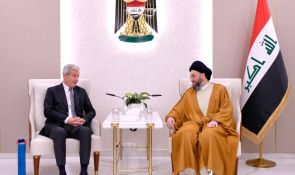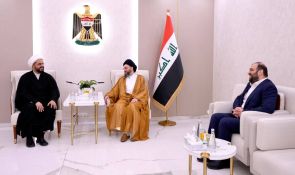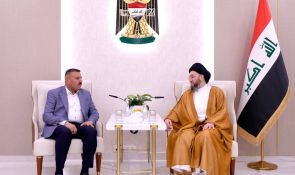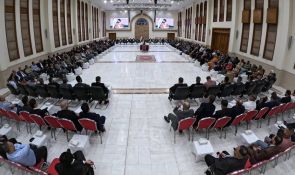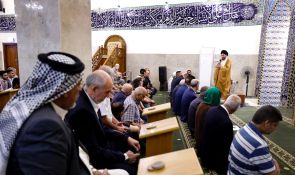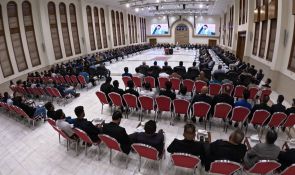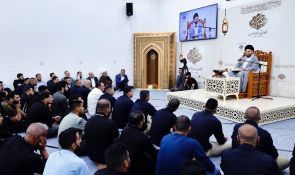Sayyid Ammar al-Hakim said, “Hussaini rituals form the frame for safeguarding the plan of Imam al-Hussain (Ú), and they are the prelude to introducing him.”
Sayyid Ammar al-Hakim, Head of the Islamic Supreme Council of Iraq (ISCI), stressed that the Hussaini rituals form the frame that has safeguarded the plan of Imam al-Hussain (Ú), and they are the prelude to acquainting people with this plan, pointing out that those who underestimate the Hussaini rituals do not understand their essence, and he has to become acquainted with them because they are a Divine project just as the plan of Imam al-Hussain (Ú) is a Divine project. He explained that these rituals were mentioned by Ahl al-Bayt, peace with them. This came up during the conference for the Hussaini processions in Baghdad at the office of His Eminence on Monday, November 12, 2012.
His Eminence recommended serving al-Hussain (Ú) by those who serve the Hussaini processions, that they must uphold the Hussaini rituals, rally round them and safeguard them as the prelude for safeguarding the Hussaini revolution, stressing the necessity for these rituals being in agreement with the Hussaini plan and at the depth of the Kerbala tragedy. He explained that the logic of al-Hussain (Ú) says that the means must be of the same type of the ends, and the plan of al-Hussain (Ú) is a Divine one which is achieved through Divine means.
The Head of the Islamic Supreme Council of Iraq pointed out to the Hussaini rituals as regarded to be the greatest institution: Its founders are Ahl al-Bayt, peace with them, the theologians, public speakers, missionaries and chanters who are members of their central administrative council. They are funded by voluntary donations. Their quarters are mosques, Hussainiyyas and homes of the faithful. He stressed that the area of its specialization is al-Hussain (Ú), those who produce it are millions of those who love al-Hussain (Ú). Its internal system is comprised by the principles of Islam and the way of Ahl al-Bayt, peace with them.
Sayyid Ammar al-Hakim stressed that the Hussaini rituals have goals which include the spiritual goal for nurturing man on being connected with al-Hussain (Ú), another educates others on the principles of Islam, another is cultural through religious jurisprudence plus a social goal through a status of solidarity and cooperation which the Hussaini rituals create. He pointed out that these rituals have a political goal because the issue of al-Hussain (Ú) is a political one through his demand, peace with him, for reform, for enjoining what is right and forbidding what is wrong, for rejecting deviation in the government system. He commended the servants of al-Hussain (Ú) to work sincerely for the sake of Allah Almighty, to be restrained, cemented, committed to time, schedules and legislative criteria. He stressed the necessity for the context of the rituals to be characterized by clarity, by taking the Kerbala issue as it was reported in reliable texts without exaggerations. He stressed that the issue of al-Hussain (Ú) is realistic, touching on people’s life. His Eminence retracted saying, “We, therefore, do not now need the historic texts; rather, we need to connect the issue of al-Husain (Ú) to the present reality,” calling for adherence to the massive dimension for the Hussaini plan and values, for focusing on the cleanliness of the place and of the clothes, stressing in his recommendations to the servants of al-Hussain (Ú) to take the security situation into consideration and not take it lightly in order to safeguard people’s lives.
It must be stated that this conference witnessed several activities, including the recitation of poems expressing love for al-Hussain (Ú) and for the Ahl al-Bayt, peace with them, emphasizing the distinction of serving them and of keeping their memory alive.


